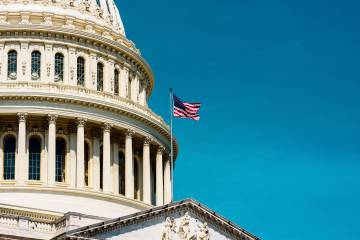- Name
- Carly Kempler
- ckemple2@jhu.edu
- Cell phone
- 443-812-8323
A set of surveys fielded last year found that a large majority of U.S. adults support COVID-19 mitigation measures, including indoor mask wearing, social distancing, and contact tracing, with significant differences across certain groups. The surveys, which followed the same people in April, July, and November 2020, were conducted by a team of researchers at the Johns Hopkins Bloomberg School of Public Health with colleagues at the SNF Agora Institute at Johns Hopkins University.
Overall public support for COVID-19 mitigation measures was strongest in April 2020 with support remaining high in July and November. The November survey found that 79% of U.S. adults supported mask wearing, 78% supported social distancing, and 73% supported contact tracing. At the same time, the surveys revealed differences in support for these mitigation measures across ages, political party affiliation, and levels in trust in science—highlighting the challenges throughout the pandemic of reaching key groups that don't always agree on public health measures needed to stem the spread of the virus.
The study, published online last week in the American Journal of Public Health, measured how people's political, religious, and civic affiliations, their beliefs about science, and their worldviews are associated with attitudes about mitigating the COVID-19 pandemic. The analysis was based on a nationally representative sample of 1,222 U.S. adults who participated in all three survey waves. For all analyses, the study authors controlled for other characteristics to understand the independent contribution of select factors in influencing attitudes about COVID-19 mitigation measures.
Broken down by political party affiliation, support for all three COVID-19 safety measures was higher for Democrats than it was for Independents and Republicans in each time period. In November 2020, support for social distancing had the biggest "support gap" between Democrats and Republicans—a 28 percentage point difference—with 91% support among Democrats and 63% support among Republicans. The survey found large differences between Democrats and Republicans for mask wearing, with a 22 percentage point difference in support between Democrats (89%) and Republicans (67%), and for contract tracing, with a 20 percentage point difference in support between Democrats (82%) and Republicans (62%).
Across the three mitigation measures, the largest support gaps were found when comparing U.S. adults who report trusting science compared with people who express doubts about science. In November, among respondents who reported trusting science "a lot," 88% supported social distancing compared to only 49% of those who reported trusting science "not much or not at all," a difference of 39 percentage points. For mask wearing, 89% of respondents who reported trusting science supported mask wearing versus 55% who did not trust science, a difference of 34 percentage points. Support for contact tracing was 83% for those who trusted science versus 35% who did not, a difference of 48 percentage points.
"It is critical to understand the sources of people's skepticism about public health safety measures during this period when we are waiting for broader access to vaccines and monitoring variants of concern," says lead author Colleen L. Barry, professor and chair of the Department of Health Policy and Management at the Bloomberg School. "Our findings reinforce the continuing need for communication approaches that target certain groups to increase knowledge and encourage adherence to COVID-19 mitigation strategies."
The researchers used NORC's AmeriSpeak Panel, a nationally representative online survey panel, to develop the survey sample, and fielded the three surveys last year: April 7–13, July 7–22, and November 11–30.
Public support for mask wearing was highest among individuals age 65 years and older—89% in both July and November, and among individuals with an annual household income of at least $75,000—84% in both July and November. In November, those with a bachelor's degree or greater were also more likely to support mask wearing (86%) compared to those with some college (77%) or a high school diploma or less (76%).
No significant differences in support for mask wearing were found between men and women, by race/ethnicity, or across different regions of the country.
Between April and November 2020, support for social distancing decreased the most for respondents ages 18–34, from 87% support in April to 72% in November (a 15 percentage point decline); for individuals who reported being in excellent health, from 90% support in April to 72% support in November (an 18 percentage point decline); for Republicans, from 84% support to 63% (a 21 percentage point decline); and for those who live in the Northeast region of the country, from 95% to 72% (a 23 percentage point decline). Most declines occurred from April to July and stabilized from July to November.
"Given such divergent attitudes about pandemic mitigation measures based on beliefs about the role of science, it is important for the scientific community to build partnerships with community and religious organizations to help build trust for science-based solutions, especially within communities where belief in science is low," says Kelly Anderson, a doctoral candidate at the Bloomberg School and co-author of the study.
Posted in Health, Politics+Society
Tagged health policy, snf agora institute, coronavirus, covid-19, social distancing









